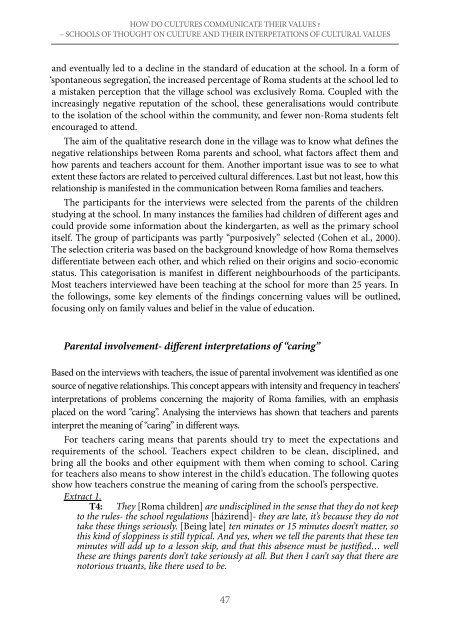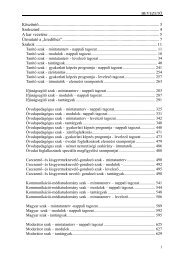ACTA SZEKSZARDIENSIUM - Pécsi Tudományegyetem Illyés Gyula ...
ACTA SZEKSZARDIENSIUM - Pécsi Tudományegyetem Illyés Gyula ...
ACTA SZEKSZARDIENSIUM - Pécsi Tudományegyetem Illyés Gyula ...
Create successful ePaper yourself
Turn your PDF publications into a flip-book with our unique Google optimized e-Paper software.
HOW DO CULTURES COMMUNICATE THEIR VALUES ?<br />
– SCHOOLS OF THOUGHT ON CULTURE AND THEIR INTERPETATIONS OF CULTURAL VALUES<br />
and eventually led to a decline in the standard of education at the school. In a form of<br />
‘spontaneous segregation’, the increased percentage of Roma students at the school led to<br />
a mistaken perception that the village school was exclusively Roma. Coupled with the<br />
increasingly negative reputation of the school, these generalisations would contribute<br />
to the isolation of the school within the community, and fewer non-Roma students felt<br />
encouraged to attend.<br />
The aim of the qualitative research done in the village was to know what defines the<br />
negative relationships between Roma parents and school, what factors affect them and<br />
how parents and teachers account for them. Another important issue was to see to what<br />
extent these factors are related to perceived cultural differences. Last but not least, how this<br />
relationship is manifested in the communication between Roma families and teachers.<br />
The participants for the interviews were selected from the parents of the children<br />
studying at the school. In many instances the families had children of different ages and<br />
could provide some information about the kindergarten, as well as the primary school<br />
itself. The group of participants was partly “purposively” selected (Cohen et al., 2000).<br />
The selection criteria was based on the background knowledge of how Roma themselves<br />
differentiate between each other, and which relied on their origins and socio-economic<br />
status. This categorisation is manifest in different neighbourhoods of the participants.<br />
Most teachers interviewed have been teaching at the school for more than 25 years. In<br />
the followings, some key elements of the findings concerning values will be outlined,<br />
focusing only on family values and belief in the value of education.<br />
Parental involvement- different interpretations of “caring”<br />
Based on the interviews with teachers, the issue of parental involvement was identified as one<br />
source of negative relationships. This concept appears with intensity and frequency in teachers’<br />
interpretations of problems concerning the majority of Roma families, with an emphasis<br />
placed on the word “caring”. Analysing the interviews has shown that teachers and parents<br />
interpret the meaning of “caring” in different ways.<br />
For teachers caring means that parents should try to meet the expectations and<br />
requirements of the school. Teachers expect children to be clean, disciplined, and<br />
bring all the books and other equipment with them when coming to school. Caring<br />
for teachers also means to show interest in the child’s education. The following quotes<br />
show how teachers construe the meaning of caring from the school’s perspective.<br />
Extract 1.<br />
T4: They [Roma children] are undisciplined in the sense that they do not keep<br />
to the rules- the school regulations [házirend]- they are late, it’s because they do not<br />
take these things seriously. [Being late] ten minutes or 15 minutes doesn’t matter, so<br />
this kind of sloppiness is still typical. And yes, when we tell the parents that these ten<br />
minutes will add up to a lesson skip, and that this absence must be justified… well<br />
these are things parents don’t take seriously at all. But then I can’t say that there are<br />
notorious truants, like there used to be.<br />
47




